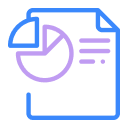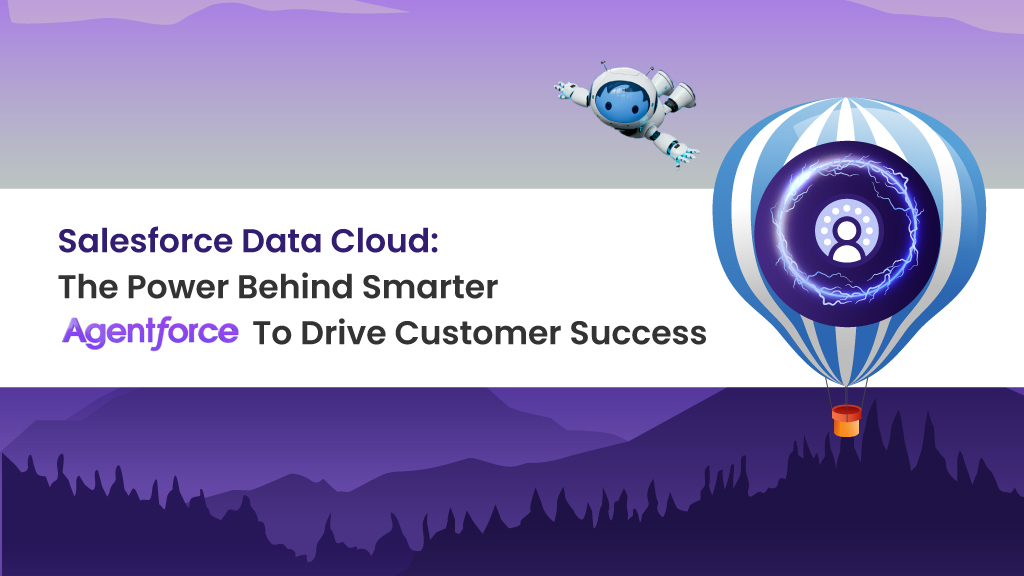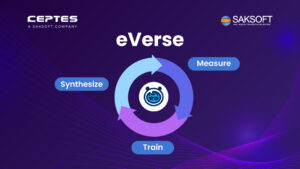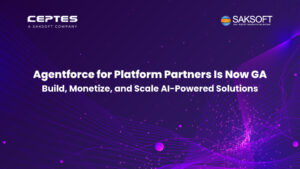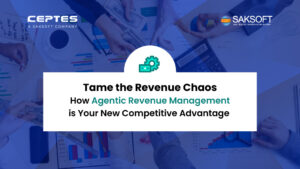As Salesforce announced the general availability of Agentforce, we are now officially living in the era of AI agents. Agentforce represents the third wave of AI revolution that goes beyond chatbots and copilots with advanced reasoning abilities to predict trends, make decisions and take actions. As Salesforce Chairman and CEO Marc Benioff said recently. “It will provide a level of transformation that we’ve never seen.”
Imagine walking into a store where the salesperson knows exactly what you’re looking for, remembers your preferences from past visits, and even suggests something you didn’t realize you needed—all without you saying a word. That’s the kind of magic companies can create with autonomous AI agents like Salesforce’s Agentforce. But how can you prepare your organization to effectively implement AI agents? If your answer is managing data, you’re spot on! That’s where Salesforce Data Cloud comes into the picture.
Salesforce Data Cloud - the heartbeat of Agentforce
Salesforce Data Cloud is the hyperscale data engine that is basically the foundation of Agentforce’s capabilities. It empowers the AI agents with all the data and metadata it needs to deliver actionable insights and connects all the dots, enabling businesses to have a holistic, up-to-date view of each customer.
Why does this pairing matter? Because together, Data Cloud and Agentforce don’t just enhance service—they revolutionize it. Customers no longer have to repeat themselves across channels, agents can provide personalized recommendations, and businesses can anticipate needs before they arise. Salesforce Data Cloud solves some crucial data challenges that enterprise customers often face while trying to integrate their agents and customer data. This includes – data silos, lack of trusted context or poor actionability. As businesses undergo digital transformation, complex data systems make it challenging to ensure data quality, hindering seamless customer experiences.
The Trust Gap In AI
Agentforce success begins with clean, contextual data. AI agents are going to change the future of work and how customer experience is managed – but for that, it requires clean, accurate and updated data. However, IT leaders struggle with an AI trust gap due to rushed adoption and poor data frameworks. As per a recent study by Salesforce, 48% of IT leaders worry their security can’t keep up with innovation because AI systems handle large amounts of sensitive data affecting individuals and businesses.
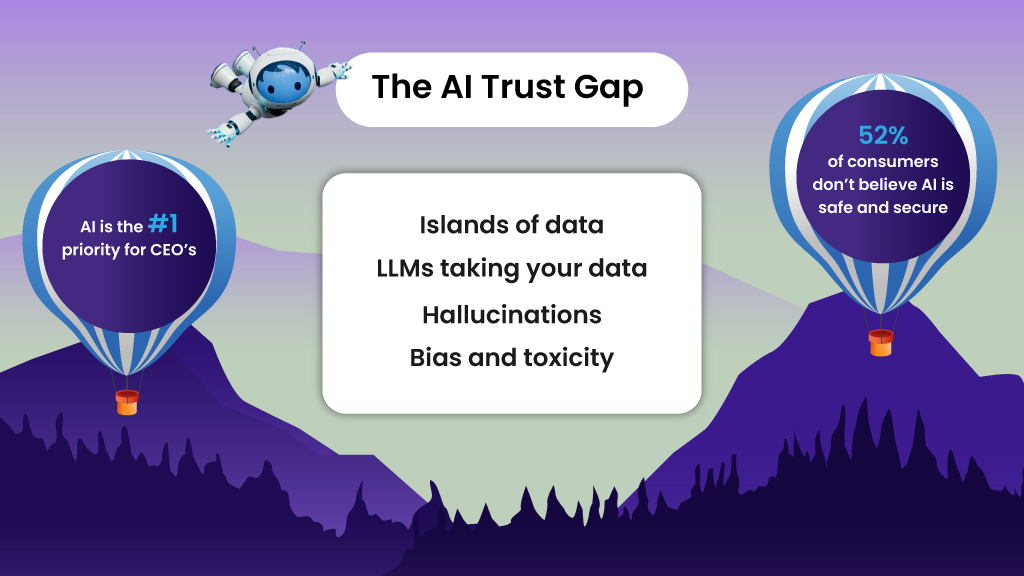
These data challenges stem from unstandardized ingestion points, inconsistent data formats, duplicate records, synchronization issues, and processing delays. While perfect data isn’t essential for AI, it must be clean and reliable to ensure success. In fact, businesses have paid the price for poor oversight, lack of proper guardrails and reliable or mislabeled data.
Storytime!
A renowned airline had to reimburse a traveller after a bot gave them wrong information about their bereavement policy. Or, take the instance of New York City’s AI chatbot, launched to help businesses, has been giving dangerously inaccurate advice—like telling landlords they can reject tenants based on their source of income, which is illegal in most cases.
Unlock Agentforce Potential with Salesforce Data Cloud
Agentforce is powered by Salesforce Data Cloud, as it unifies structured and unstructured data from various sources in real time. By integrating deeply with the Customer 360, it provides trusted, contextual data and enables autonomous actions within workflows, giving Agentforce a complete and up-to-date view of every customer.
Deep integration with Salesforce customer 360 platform:
Data Cloud powers Agentforce by integrating trusted customer data across the Salesforce Customer 360 platform and applications, enabling personalized experiences, real-time analytics, and AI-driven actions. It consolidates structured and unstructured data from various sources, including data lakes and warehouses, using zero-copy technology and MuleSoft connectors.
The vector database transforms unstructured content like PDFs, calls, videos, and images into usable data, creating comprehensive customer profiles stored as metadata. Fully integrated into Salesforce, this data flows seamlessly across applications to provide a 360-degree view, drive automation, and enhance service teams’ contextual understanding.
Trusted, Contextual Data:
Data Cloud provides Agentforce with trusted, contextual data grounded in the organization’s proprietary customer using Retrieval Augmented Generation or RAG and hybrid search. RAG helps retrieve the right data from multiple sources, enhancing user prompts and extracting value from large language models. Hybrid search combines semantic vector search with keyword search, making it easy to find relevant information, even for specific terms like product names or acronyms. This ensures Agentforce has quick access to the most valuable insights from both structured and unstructured data.
Autonomous Actions with Real-Time Insights:
Data Cloud empowers organizations to turn data into immediate, autonomous actions by unifying customer profiles and integrating analytics, AI, and automation. It enables sales, service, and marketing teams to act on real-time insights, enhancing customer interactions through personalized recommendations and timely responses. With a sub-second real-time layer, Data Cloud powers Einstein Personalization, machine learning, and AI-driven suggestions, enabling smarter decision-making and seamless workflows across teams.
For example, Agentforce uses Data Cloud to deliver personalized, real-time recommendations and offers, enhancing engagement and driving innovation with instant notifications in Slack and actionable insights in Tableau.
Build a Data Strategy for Agentforce Success:
Your data doesn’t need to be perfect to build a great AI agent program, but it should be clean. That means it should be free of errors, duplicates, and incorrect formats. Here’s how to clean up your data and make it ready for AI:
1. Remove Duplicates and Irrelevant Data
Duplicates happen when you combine data from different sources. Irrelevant data is when something doesn’t fit your analysis, like using data on elderly consumers for a study on millennial shopping habits. Remove these to make your data more efficient and accurate.
2. Fix Structural Errors
Structural errors are things like typos, inconsistent capitalization, or mislabeling. For example, “N/A” and “not applicable” mean the same thing, but an AI might treat them differently. Make sure everything is consistent.
3. Filter Outliers
Outliers are data points that don’t match the rest of your data. Sometimes they’re due to mistakes, but other times they might be key to your analysis. Review them carefully to decide if they should stay or go.
4. Handle Missing Data
Missing data is common, and it can affect the accuracy of AI models.
- Remove rows with missing data, but you might lose some information.
- Fill in missing data based on what you already have, however that might affect data integrity as you’re operating from assumptions and not actual observations.
- Find a different way to work with the data to effectively navigate the missing values.
5. Validate the Data
After cleaning your data, it’s time to validate it. Start by checking if the data makes sense and aligns with what you expect. Ensure it follows the correct rules and standards for its specific field. Consider whether the data supports or challenges your initial theory, and look for trends that could guide your next steps. If the data still doesn’t seem right, it might indicate underlying issues that need further attention before moving forward.
Cleaning your data is the first step toward building a successful AI agent program. When done right, it ensures the AI has reliable, actionable information to work with.
The Future of Customer Service
As customer expectations continue to evolve, businesses need to stay ahead of the curve. The combination of Salesforce Data Cloud and Agentforce offers a blueprint for smarter, faster, and more personalized service. By leveraging a unified data strategy, businesses can create experiences that not only satisfy but also delight customers.
Looking ahead, the possibilities are endless. With advancements in AI, machine learning, and automation, Data cloud and Agentforce will only get smarter. Imagine predictive service capabilities, where businesses can solve problems before customers even know they exist, or hyper-personalized experiences that feel tailor-made for every individual.
The future of customer success is here—and it’s powered by Agentforce.
Ready to take the leap? Our Data Cloud & AI experts can help. Contact us now!
FAQ:
1. What are the key benefits of combining Salesforce Data Cloud with Agentforce?
The combination provides advanced analytics, AI-driven recommendations, and seamless data integration, enhancing agent productivity and enabling a 360-degree view of customers.
2. Can small and medium-sized businesses leverage Salesforce Data Cloud with Agentforce?
Yes, Salesforce Data Cloud is scalable and customizable, making it suitable for businesses of all sizes, including small and medium enterprises.
3. How does Salesforce Data Cloud handle data privacy and security?
Salesforce Data Cloud adheres to robust security protocols and complies with global data privacy standards like GDPR and CCPA, ensuring secure and compliant data management.
4. What industries can benefit the most from using Salesforce Data Cloud with Agentforce?
Industries such as retail, healthcare, financial services, and manufacturing can benefit greatly by leveraging real-time insights and predictive analytics to improve customer satisfaction and operational efficiency.
1. How does RAG handle privacy concerns with sensitive information?
2. How does RAG compare to traditional retraining for LLM performance enhancement?
3. What are the key challenges in implementing RAG models?

Nilamani Das
Nilamani is a thought leader who champions the integration of AI, Data, CRM and Trust to craft impactful marketing strategies. He carries 25+ years of expertise in the technology industry with expertise in Go-to-Market Strategy, Marketing, Digital Transformation, Vision Development and Business Innovation.










